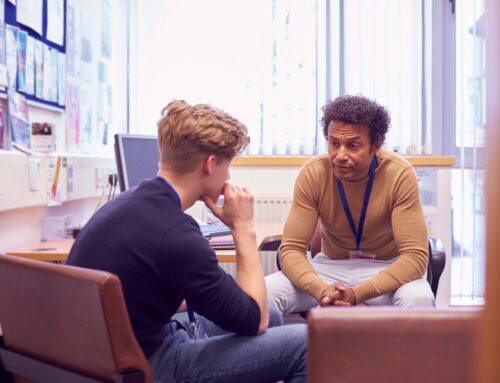 While the thought of attending an interview can be scary, with careful preparation and practice it can ultimately turn out to be a rewarding experience. You can use these sample mock questions to help you prepare and get ahead.
While the thought of attending an interview can be scary, with careful preparation and practice it can ultimately turn out to be a rewarding experience. You can use these sample mock questions to help you prepare and get ahead.
Taken from Getting into Medical School 2020 Entry by Adam Cross and Emily Lucas.

Interview questions generally fall into the following categories.
- Background and motivation for medicine: Can you tell us about any particular life experiences that you think may help or hinder you in a career in medicine?
- Knowledge of the medical school and teaching methods: What interests you about the curriculum at [medical school]? What previous experiences have you had of learning in a small group setting?
- Depth and breadth of interest: Do you read any medical publications?
- Empathy: Give an example of a situation where you have supported a friend in a difficult social circumstance. What issues did they face and how did you help them?
- Teamwork: Thinking about your membership of a team (in a work, sport, school or other setting), can you tell us about the most important contributions you made to the team?
- Personal insight: How do you think you will avoid problems of keeping up to date during a long career?
- Understanding of the role of medicine in society: What problems are there in the NHS other than the lack of funding?
- Work experience: What experiences have given you insight into the world of medicine? What have you learnt from these?
- Tolerance of ambiguity and ethics: Is it better to give healthcare or aid to impoverished countries?
- Creativity, innovation and imagination: Imagine a world in 200 years’ time where doctors no longer exist. In what ways do you think they could be replaced?
Additional example questions for each category
Questions appear from the following categories. Ask a family member, friend or teacher to work through them with you.
Background and motivation for medicine
- Tell us about yourself.
- Why do you want to be a doctor? What do you want to achieve in medicine?
- What aspect of healthcare attracts you to medicine?
- What steps have you taken to try to find out whether you really do want to become a doctor?
- What do you think are the main challenges of becoming a doctor/studying medicine?
- What things do you think might make people inclined to drop out of medical training?
Knowledge of the medical school and teaching methods
- What interests you about the curriculum at [medical school]?
- Tell us what attracts you most and least about [medical school].
- What do you know about PBL?
- Why do you want to come to a PBL medical school? (If relevant.)
- What do you think are the advantages and disadvantages of a PBL course? (If relevant.)
- Why do you think problem-based learning will suit you personally? (If relevant.)
Depth and breadth of interest
- Do you read any medical publications?
- What do you think was the greatest public health advance of the twentieth century?
- Can you describe an interesting place you have been to (not necessarily medical) and explain why it was so?
- If you had to have a gap year, and could go anywhere in the world or do anything, what would you choose to do, and why?
- How do you think the rise in information technology has influenced/will influence the practice of medicine?
- If you could invite three people, alive or dead, to dinner, who would they be?
Empathy
- Give an example of a situation where you have supported a friend in a difficult social circumstance. What issues did they face and how did you help them?
- How would you go about informing a patient that they have terminal cancer?
- What does the word empathy mean to you? How do you differentiate empathy from sympathy?
- What do you guess an overweight person might feel and think after being told their arthritis is due to their weight?
- A friend has asked your advice on how to tell her parents that she intends to drop out of university and go off travelling. How would you respond?
Teamwork
- Tell us about a team situation you have experienced. What did you learn about yourself and about successful team-working?
- When you think about yourself working as a doctor, who do you think will be the most important people in the team you will be working with?
- Who are the important members of a multi-disciplinary healthcare team? Why?
- Are you a leader or a follower?
- What are the advantages and disadvantages of being in a team? Do teams need leaders?
Personal insight
- Have you ever been in a situation where you realise afterwards that what you said or did was wrong? What did you do about it? What should you have done?
- How do you think doctors keep up-to-date with changes and advances during a long career?
- What are your outside interests and hobbies? Which do you think you will continue at university?
- Tell us two personal qualities you have which would make you a good doctor, and two personal shortcomings which you think you would like to overcome as you become a doctor?
- Medical training is long and being a doctor can be stressful. Some doctors who qualify never practise. What makes you think you will stick to it?
- What do you think will be the most difficult things you might encounter during your training? How will you deal with them?
Understanding of the role of medicine in society
- What is wrong with the NHS?
- Would you argue that medicine is a science or an art, and why?
- Why do you think we hear so much about doctors and the NHS in the media today?
- In what ways do you think doctors can promote good health, other than direct treatment of illness?
- Do you think patients’ treatments should be limited by the NHS budget or do they have the right to new therapies no matter what the cost?
- What do you understand by the term ‘holistic’ medicine? Do you think it falls within the remit of the NHS?
Work experience
- What experiences have given you insight into the world of medicine? What have you learnt from these?
- What aspect of your work experience did you find the most challenging, and why?
- Share something from your work experience or voluntary work that particularly interested you.
- Share something from your work experience that particularly shocked you.
- What aspect of your work experience would you recommend to a friend thinking about medicine, and why?
- Thinking of your work experience, can you tell me about a difficult situation you have dealt with and what you learned from it?
Tolerance of ambiguity and ethics
- Is it better to give healthcare or aid to impoverished countries?
- Should doctors have a role in contact sports such as boxing?
- Do you think doctors should ever go on strike?
- How do you think doctors should treat injury or illness due to self- harm, smoking or excess alcohol consumption?
- Female infertility treatment is expensive, has a very low success rate and is even less successful in smokers. To whom do you think it should be available?
- Would you prescribe the oral contraceptive pill to a 14-year-old girl who is sleeping with her boyfriend?
Creativity, innovation and imagination
- You are going to university and you can take a suitcase with just six items in it. What would you take and why?
- Imagine a world in 200 years’ time where doctors no longer exist. In what ways do you think they could be replaced?
- Describe as many uses as you can for a mobile phone charger.
- How might you improve the process of selecting students for this medical school?
- Your house catches fire in the night. You are told you can pick only one object to take with you when escaping. What would it be and why?

Emma Davies works within the editorial department at Trotman Publishing. Graduating from her Masters degree in 2017, she is familiar with all aspects of the student journey through university. She is passionate about helping students find the right career, and was a member of the SYP’s inaugural committee in the South West.





